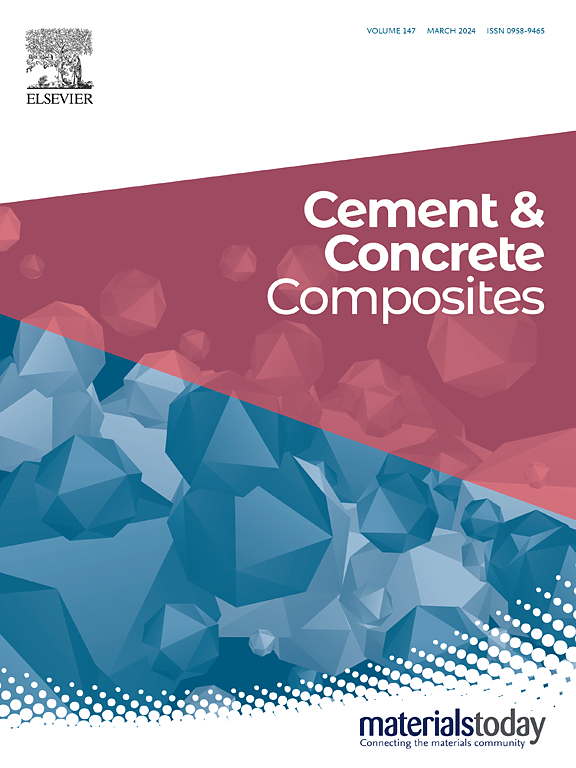Improving the carbonation resistance of supersulfated cement by nano SiO2 and silica fume
IF 10.8
1区 工程技术
Q1 CONSTRUCTION & BUILDING TECHNOLOGY
引用次数: 0
Abstract
Supersulfated cement (SSC) is a low-carbon material with limited carbonation resistance due to its high content of easily carbonated components (AFt) and low content of carbonation-resistant components (C-(A)-S-H gel and portlandite). This study aims to utilize reactive siliceous materials (nano-silica (NS) and silica fume (SF)) to optimize the product composition of SSC and enhance its carbonation resistance. Incorporating 3 % of ultrasonic-dispersed/non-ultrasonic-dispersed NS and SF into SSC, this study explores their effects on the mechanical properties of SSC before and after carbonation, carbonation depth, phase composition, and micro-morphology. Results show that both SF and NS promote the hydration, increasing hydration products and compressive strength, with NS being more significantly. While SF increases the flexural strength, NS reduces it. NS could modify the morphology and structure of AFt and C-(A)-S-H gel, resulting in a better carbonation resistance effect than SF. Both ultrasonic-dispersed NS and non-ultrasonic-dispersed NS have almost the same effect on the performance of SSC, with undispersed NS slightly reducing flexural strength more. This study highlights the critical role of AFt in the flexural strength and reveals that increasing the content of C-(A)-S-H gel is crucial for enhancing carbonation resistance. Combination of NS and SF (or other ultrafine powders) offers a promising approach to improving the carbonation resistance of SSC.
用纳米SiO2和硅粉提高过硫酸盐水泥的抗碳化性能
超硫酸盐水泥(SSC)易碳化成分(AFt)含量高,耐碳化成分(C-(a)- s - h凝胶和硅酸盐)含量低,是一种低碳材料,抗碳化能力有限。本研究旨在利用反应性硅质材料(纳米二氧化硅(NS)和硅粉(SF))优化SSC的产品组成,提高其抗碳化性能。在SSC中加入3%超声分散/非超声分散的NS和SF,探讨其对SSC碳化前后力学性能、碳化深度、相组成和微观形貌的影响。结果表明:SF和NS均能促进水化,提高水化产物和抗压强度,其中NS的作用更为显著;SF增加了抗弯强度,而NS降低了抗弯强度。NS可以修饰AFt和C-(A)- s - h凝胶的形态和结构,抗碳化效果优于SF。超声波分散和非超声波分散对SSC性能的影响几乎相同,未分散的NS略微降低SSC的抗弯强度。本研究强调了AFt在抗弯强度中的关键作用,并揭示了增加C-(A)- s - h凝胶的含量对于增强抗碳化能力至关重要。NS与SF(或其他超细粉体)的结合为提高SSC的抗碳化性能提供了一条很有前途的途径。
本文章由计算机程序翻译,如有差异,请以英文原文为准。
求助全文
约1分钟内获得全文
求助全文
来源期刊

Cement & concrete composites
工程技术-材料科学:复合
CiteScore
18.70
自引率
11.40%
发文量
459
审稿时长
65 days
期刊介绍:
Cement & concrete composites focuses on advancements in cement-concrete composite technology and the production, use, and performance of cement-based construction materials. It covers a wide range of materials, including fiber-reinforced composites, polymer composites, ferrocement, and those incorporating special aggregates or waste materials. Major themes include microstructure, material properties, testing, durability, mechanics, modeling, design, fabrication, and practical applications. The journal welcomes papers on structural behavior, field studies, repair and maintenance, serviceability, and sustainability. It aims to enhance understanding, provide a platform for unconventional materials, promote low-cost energy-saving materials, and bridge the gap between materials science, engineering, and construction. Special issues on emerging topics are also published to encourage collaboration between materials scientists, engineers, designers, and fabricators.
 求助内容:
求助内容: 应助结果提醒方式:
应助结果提醒方式:


